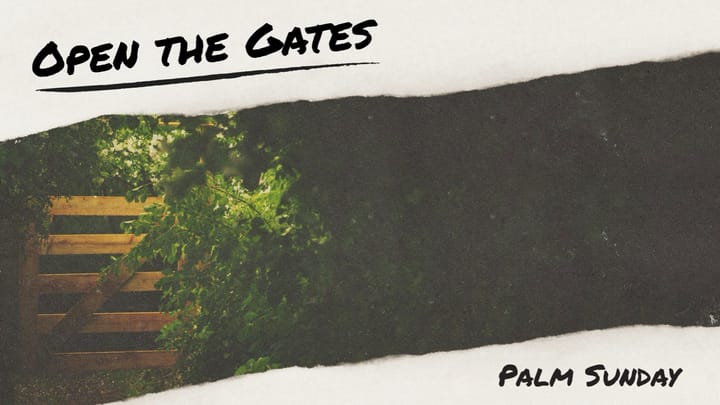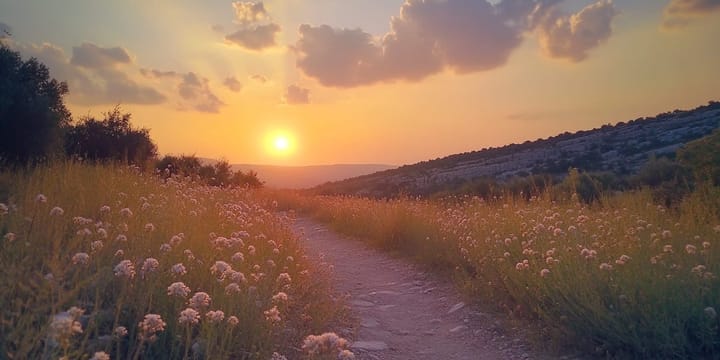Fairhaven Sermon 3-23-2025

Summary
In this week’s service at Fairhaven United Methodist Church, Pastor Rev. Peg Bowman continued the series "Steadfast Love: A Lenten Playlist" by focusing on maintaining a close relationship with God amidst life's distractions during the third week of Lent. The sermon centered around using U2's song "The Lights of Home," which speaks to feelings of doubt and the unwavering promises of faith. Rev. Bowman emphasized that true home is in the presence of God, regardless of physical location or circumstances.
Bowman drew from scripture readings—beginning with Luke’s Gospel, Isaiah, and David's Psalm 63—to illustrate how Jesus teaches against attributing divine punishment to human sinfulness. In the gospel passage, despite a tragic event where Pilate kills some Galileans during temple sacrifices, Jesus does not blame or judge those who suffered but encourages people to seek God for comfort. This led into Isaiah’s words of encouragement and invitation to come to God in times of need, promising satisfaction and joy.
Additionally, Bowman highlighted the importance of seeking God today rather than yesterday or tomorrow by referencing Isaiah's directive "Seek the Lord while he may be found." She also warned against using David as an excuse for unrepentant sin, emphasizing that true repentance involves acknowledging one’s mistakes and turning to God with sincerity. The sermon concluded on a hopeful note, encouraging congregants to stay close to God throughout Lent and beyond by setting aside distractions and focusing on meaningful spiritual practices like prayer and scripture reading.
Transcript
Well, good morning again. And as you know, today we're in the third week of Lent and the third week in our sermon series called Steadfast Love, a Lenten Playlist. And for any of you who missed the past couple of weeks, what we've been doing is that each week in Lent, we're featuring a song that has something to do with the day's message. And today's song, which you heard a moment ago, is The Lights of Home by U2, and it's I've always liked the band U2 because their songs often talk about God and faith, even if they're not always coming straight out and saying that's what they're doing.
And this is one of those songs. This particular song, I think, is written from the point of view of a person of faith who is going through a tough time and is starting to feel doubts about whether God is really there or whether God really cares about. And at the same time, the singer can see in the distance the lights of home, and he feels that God's promises are not in vain. So the question then becomes, where exactly is home? I mean, home has a lot of things we can think of as home.
Is home our house? Is home our church? Is home the company of friends we hang out with? Is home the place where everybody knows your name, like in Cheers? No. What is it that makes us feel like we're home? The answer the Bible would give, especially in the words of Isaiah and David, is that our home is in the presence of God, wherever God is. And God is everywhere. So when we stay close to God, then wherever we go is home.
For this reason, we need to keep our focus on God, on our relationship with God, because it is so easy to get distracted. We get distracted by to-do lists, by friends, by social media, by news and current events, even by working hard to meet the needs that we see around us. The bottom line, our relationship with God has to come first. Otherwise, we just end up spinning our wheels.
Yes. So this Lent, we want to make our focus on making God number one. Our Breakthrough Prayer Project is one way to approach this. It also helps to set aside time every day just to read the Bible and talk to God about what we're reading.
And I find it usually helps to do these things at the same time every day, so it sort of becomes a habit. But, So with all this said as a foundation, let's turn to our scriptures for today. And I want to say this in advance. Each reading touches on Lenten themes, but at first glance, the three readings don't seem to have a whole lot to do with each other.
So let me start by painting the really big picture, okay? In the gospel reading, Luke presents us with a problem. Okay. In the Old Testament reading, Isaiah invites us to hear God's answers to that problem. And in the Psalm, David shows us what it looks like and feels like when we put those answers into practice.
So problem, solution, and practice. And what's weird about that is it's not in chronological order, but it will fit. So hang with me. That's the big picture framework.
So starting with the Gospel of Luke, in this reading, Jesus is with a group of people and he is teaching when some unnamed people come up to him and they share the horrible news that Pontius Pilate has killed some Galileans and has mixed their blood with the blood of the sacrifices in the temple. And, Now, this is a tragedy on many levels, and I'm not familiar with the ancient cultural expectations as much as I would like to be, but I know if this news came to us today in our culture, I think most people would want to hear Jesus say something from the heart, something to express his sorrow or his anger or his grief and express compassion and solidarity with the families of the dead. But Jesus doesn't do that. Instead, he's aware that for many people, when bad things happen, the first impulse is to find someone to blame.
And Jesus immediately moves to correct the thinking of anyone who might think that bad things happen to bad people, that this happened because these Galileans were sinners, or that these things only happen to people who have let their relationship with God slide and they're not going to blame. or that bad things happen because God is trying to get somebody's attention. These are common teachings, even today, among people who read scriptures the wrong way. In fact, this kind of thinking is related to the heresy that's known today as dominion theology, and that all of God's people who are good and who are faithful should have dominion over every aspect of life, and therefore something terrible like this never happens to a good person.
Jesus helps the people understand that this is not the case, and placing blame is not helpful. He says, Do you think that because these Galileans suffered like this, that they were worse sinners than other Galileans? No, Jesus says. But, he says, unless you change course, you will perish as they did. And Jesus adds, The same goes for the people who died when the Tower of Siloam fell on them.
They were no worse sinners than anyone else. But unless you change course, you will perish as they did. And by change course, Jesus means, steer for the lights of home. And then Jesus illustrates this point by telling an unusual parable.
Jesus tells the story of a landowner who had been growing a fig tree for three years. And all three years he came looking for figs and didn't find any. So the third year he says to his gardener, get rid of this tree, it's not producing any fruit, and we can use the land for other things. But the gardener says, let me work with it for another year.
I'll dig around it. I'll put some manure on it. Maybe it will bear some fruit next year. And if not, then we can cut it down.
The parable sees people as being like that fig tree. Each one of us is here on earth to produce fruit. That is to do good things for God's kingdom, to create, to maintain, to help, to heal. Whatever we do in our careers or in our lives at home or in the neighborhood, we're going God, who is the creator and healer and sustainer and caregiver, looks for us to live lives that reflect God's goodness into the world so that people can look at us and see a reflection of the God that we worship.
So Jesus, in a way, came to earth to help us to be fruitful and to save us like that gardener when we don't quite bear fruit the way we hope to. We can trust that our gardener knows what to do and will do what is needed. Now just because a person may have had a tough life doesn't mean that that person has been straying from God. I mean, think about all the difficulties and dangers that the saints lived through, down through the centuries.
Some of our very best of our Christian brothers and sisters have suffered things we can't even begin to imagine. But all of them, whoever they were, wherever they were, were faithful to God, and their reward was to see the comfort of the lights of home. So that's our gospel reading. Moving then to the words of Isaiah and God's solution to the human problems.
The prophet offers us wonderful encouragement. And Isaiah gets right to the point. He says, are you hungry? Come to God. Are you thirsty? Come to God.
Are you troubled? Come to God. And when Isaiah talks about being hungry or thirsty, this could be physically or it could be spiritually. Right? Jesus once said, Blessed are you who hunger and thirst after righteousness, for you will be satisfied. God satisfies both the spiritual and the physical hunger.
And it really is a mystery how often and how many ways people spend time and money on things that don't satisfy. When we walk with God, we can find peace and joy and satisfaction, food for our souls. And this doesn't mean we have a perfect life, just that in times of trouble, we know the joy of having God walking with us. Jesus.
God says to us through Isaiah, come to the waters. You who have no money, come, buy, and eat. Everyone is invited to God's table. And like Fran said a moment ago, all means all.
Flo, I'm sorry, Flo, I'm sorry. Anyway, and the people of Israel who Isaiah was talking to, they were people whose hearts were still hurting from the exile. They were finally home back in Israel, but only recently, and there was a lot of rebuilding to do, a lot of work to do. Isaiah says that those who've lost homes will be provided with good things, and those who've gone without will have plenty.
And those who've been on the outside looking in will become witnesses to the nations of God's goodness. And speaking of the nations, God says to Israel through Isaiah, you shall call nations you do not know, and nations you do not know shall run to you. And this has been fulfilled all around the world for the past 3,000 years. The people have come to know God and then later come to know Jesus because of God's people Israel.
Israel. When we turn to the God of Israel, we are, in the words of you too, running to the lights of home. So if God says, eat what is good and delight yourself in rich food, I don't know about you, but my first question is, where's the dining room? Let's eat. Let's do this.
So the way into the dining room is to follow the lead of the owner of the house. God is the one who directs us there. The covenant with David that Isaiah talks about, by God's grace, is open to you and me. God says, For as the heavens are higher than the earth, so are my ways higher than your ways, and my thoughts than your thoughts.
And I think, how true is that? I mean, think about how we think. I mean, if I compared my thoughts, for example, to the thoughts of Albert Einstein, do I understand what Einstein said? No. Even when he wasn't talking about physics, I didn't understand what he was saying. And how much higher is God than Einstein? Einstein.
And this is why trusting God is so important, because there's no way we can possibly understand God with our minds. I think sometimes our hearts understand God better than our minds do. And then Isaiah changes direction for a moment, and he starts to talk about David. And we're going to be listening to the words of David in just a moment.
But the first thing I notice is that God talks about my steadfast, this is God speaking, my steadfast, sure love for David. And Isaiah wrote this hundreds of years after David passed. So Jesus, who was a descendant of David, as he once said, God is not the God of the dead, but of the living. Amen.
So David has made it to the lights of home. He's already there. He's in God's kingdom. And there, David is very much alive.
Then Isaiah tells us to seek the Lord while he may be found. The road leading to home will not be open forever. We can't seek God yesterday. And we can't seek God tomorrow.
Only today can we seek God. Amen. This time of Lent really is a time to set aside the things of life that come between us and God, those things that get in the way of obeying God's command to love others. Isaiah says, 'Leave unrighteous thoughts and unworthy things behind.
Return to the Lord, who is ready to welcome us into the banquet.' Now, before we turn to the words of David, this is a big side note over here, but I wanted to share a word of warning on this. I have heard a lot of people lately talking about King David, people who have experience with the scriptures, not just everyday people off the street, and they point out that David was a sinner and that he committed adultery and then arranged for the death of Bathsheba's husband. And these people say, and look, God still used David anyway.
And they say these things to make excuses to make excuses. for people living today who cheat on their spouses or who arrange for people to be disappeared like Bathsheba's husband. And they say, if God forgive David, who are we to judge so and so when they do such and such? This is a deception of the worst kind because it leads people to believe in cheap grace. Yes, David was a sinner, but when God confronted David about his sins, David didn't make excuses, and he didn't act like what he'd done wasn't important.
David prayed to God saying, Have mercy on me, O God, According to your unfailing love, according to your great compassion, blot out my transgressions, wash away all my iniquity, cleanse me from my sin, for I know my transgressions and my sin is always before me. When God confronted David, David admitted what he'd done and wept over his sin. He did not try to justify his actions. He did not try to dodge the truth.
He did not try to avoid God's judgment. David took responsibility. He took the blame, and it could have cost him his throne. In fact, almost did, except that God had mercy.
there is no parallel between David's sin and deliberate unrepentant sins that people commit in the name of God, especially when those people committing the sins are leaders in the church or are leaders of any kind, people who have a responsibility to do what is right. And I just wanted to be very clear about that. So having said all this, let's listen with confidence to what David says about getting closer to God in Psalm 63. When David was writing this Psalm, he was in the wilderness of Judah.
Now, what exactly he was doing there, we don't know. David also often went to the wilderness when he was in danger, and he was in danger many times in his life, so we're not sure exactly when this was. But the Judean wilderness is known for being a very uncomfortable place, very rocky, very dry, not a lot to eat out there. But David keeps his focus on God and he prays, 'Oh God, you are my God.
I look for you. My soul is thirsty for you. I want you like this desert wants water,' David says. God's love is better than life itself, he says.
Jesus knew this too, and so did all the saints and martyrs down through the years. God's love is better than this life. Not that this life is anything to sneeze at. David says, I remember being in your house, being in worship, where David felt the lights of home.
And David longs to be there again with God's people, worshiping God. David wants to be close to God, to see with his own eyes, God's power and God's glory. David says, My soul is satisfied, just remembering spending time with God. People in general try to be satisfied with so many things that don't satisfy.
Power, money, food, exercise, relationships, you name it. All these things bring pleasure and they're good things, but they don't satisfy for long. They leave us wanting more. But for someone who loves God, to be close to God is to be satisfied.
David sings, My mouth praises you, my soul clings to you, and your right hand holds me up. David chooses to love God, no holds barred. When David looks in God's direction, he sees the lights of home. This season of Lent, we are invited to do the same, to be intentional about spending time with God, who loves us and who our hearts love.
Let us reorient ourselves to God's truth and God's compassion, and let us pray that our faith will produce the fruit that the heavenly gardener is looking for. Let us walk through Lent and through life, knowing that God is with us and trusting God for every step of the way. Amen.


